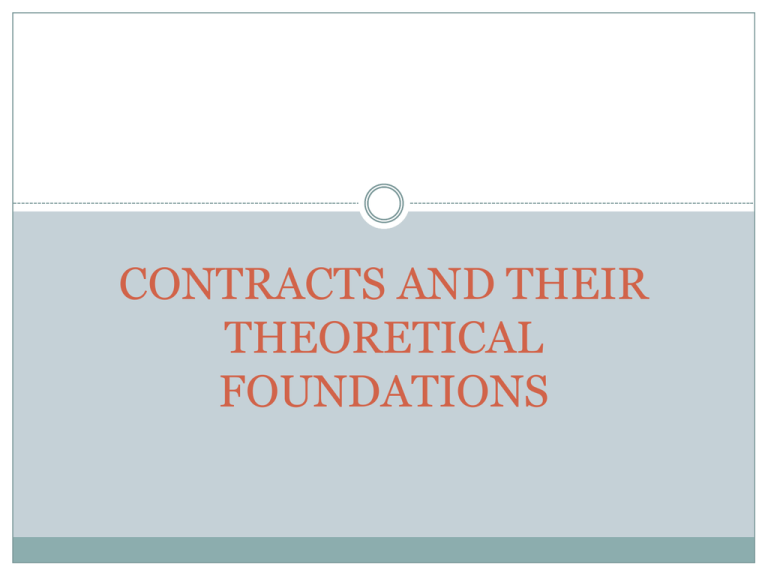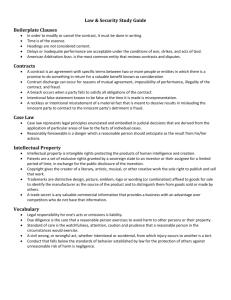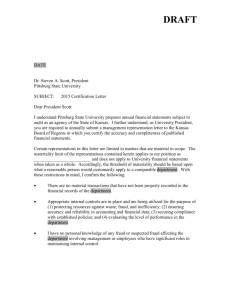contracts and their theoretical foundations
advertisement

CONTRACTS AND THEIR THEORETICAL FOUNDATIONS OUTLINE Definition Freedom of contracts Sanctity of contracts Contracting parties beware Protecting the innocent third party purchaser Reasonableness Intolerance of fraud DEFINITION The theoretical foundations refer to the philosophical justifications, their underlying principles, and their sub-strata. They cover two matters namely; (1) the reasons why contracts must be respected and enforced; and (2) the reasons why some transactions are excluded from the status of contracts even if advanced the contracting party(s). There are six of such principles, including (1) freedom of contracts; (2) sanctity of contracts; (3) contracting party beware; (4) protecting the innocent third party purchaser; (5) reasonableness; and (6) intolerance of fraud. Freedom of Contracts CONTI’ In simple terms, it means parties, no matter who they are at liberty to enter into contracts. The limitation is that (1) the parties must have capacity to undertake the contracts entered into; (2) the transactions must be legal. Hence, freedom of contract means the liberty of parties with capacity to enter into contracts on terms set for themselves so long at it is legal at the time of the contract. Freedom of Contracts CONTI’ Legal persons include, the Republic, corporate bodies and individuals; these persons can enter into contracts. Persons without capacity includes, insane (non compos mentis), terribly drunk, infants (below 18 years) or bankrupt. Freedom of contract merges into Sanctity of Contract. Sanctity of Contracts After parties enter into contracts by freewill, the law treats this agreement as sacred; ‘’Pacta sunt Servanda’’. The law is concerned about the freewill not the fairness of the contract. Hence, if A who is a legal person enters into a contract with B who is also of sound standing in law to undertake a legal contract, the law will not entertain complaints of fairness. Consideration must thus be sufficient not adequate. Sanctity of Contracts CONTI’ In Bainbridge v Firmstone (1938), the defendant who owned valuable boilers approached the plaintiff who had a weighing scale and said that he wished to weigh the boilers and thereafter he would give the boilers to the plaintiff but after the plaintiff gave it, the defendant refused to return it. The plaintiff sued successfully. Courts uphold sanctity of contracts for (i) there is a judicial deference to the contracting parties and (ii) the courts are reluctant to substitute terms freely entered into by the parties. The principle is not a licence for fraud or to deceive illiterates and blind. CONTRACTING PARTY BEWARE Traditionally, the governing maxim was ‘caveat emptor’, meaning ‘’buyer beware’’, but was expanded to include ‘caveat venditor’, meaning ‘’seller beware’’ hence contracting parties beware. Each party must satisfy himself about the identity, credit worthiness of the other party; fitness, quality, existence, usefulness of land among others of the goods. CONTRACTING PARTIES BEWARE CONTI’ Four things are required of the wary contracting party: (1) a contracting party must inspect or otherwise undertake due diligence measures. (2) a contracting party must obtain appropriate (written) warranties and indemnities from the other contracting party. (3) a contracting party must seek professional advise such as from lawyers, accountants, valuers, etc (4) a contracting party must obtain appropriate insurance cover against damage, loss or liability This principle is also not a licence for fraud or to misrepresent. PROTECTING THE INNOCENT THIRD PARTY PURCHASER The third party, without notice of any fraud or deficiency, obtains a contractual benefit is entitled to keep it. An innocent third party is one who does not know in fact or constructively of the existence of fraud, mistake or deficiency. A third party is one who is not a party to a given transaction. In Seidu v. ADB (1992), it was held Benin J that the plaintiff was a bona fide purchaser for the value of the vehicle without notice of any defect in the vendor’s title or any adverse title hitherto. PROTECTING THE INNOCENT THIRD PARTY PURCHASER CONTI’ A purchaser is the party who has obtained the benefit or good by providing consideration for it. If consideration is absent, the party is described as a volunteer not a purchaser. A third party who knows or should have known that a fraud was made or a deficiency exist is not innocent. REASONABLENESS Reasonableness is said to be the law’s best friend; they keep close company. It connotes moderation; temperance; normal ordinary or regular conduct. It excludes the extreme or absurd Reasonableness is a question of fact ultimately decided by the court after assessing all the circumstances In making such determination, the court places itself in the position of the ordinary person or layman. A reasonable person is the ordinary layman or the ordinary technical person as the case may be, depending on the matter in issue. REASONABLENESS CONTI’ Reasonableness features in; implied terms, quantum meruit, exemption clauses, mitigation of damages, and remoteness of damages. REASONABLENESS CONTI’ The basis here is that the reasonable terms so implied are presumed to have been intended by the parties to give business efficacy to the contract. By implying the terms, the courts merely does what the parties themselves would have done in fact in order to cover the situation had the averted their minds to that situation. INTOLERANCE OF FRAUD Finally, the law has no tolerance of fraud, hence the Latin maxim, ‘fraud omnia vitiate’, meaning, fraud vitiates everything! Fraud, deceit and dishonesty are considered a trinity of turpitude. Fraud may manifest itself in words or conduct. Derry v Peek (1889), defines a fraudulent misrepresentation as one made by a person to induce another into a contract knowing very well that the statement he is making is false, or recklessly making a statement not caring that it is true or false. Fraud manifest itself in conduct when one does something, with the intention of inducing reliance for perfomance by another knowing very well that his action is of no right or truth. INTOLERANCE OF FRAUD CONTI’ Intolerance of fraud manifests in these two ways; 1. fraud renders contracts voidable ( a vitiating factor). Thus, If the court’s assistance is sought in a timely manner, if no third party rights have intervened and if not other grounds exist which will make the inequitable or unjust to do so, the court will set aside a contract tainted by fraud to protect the innocent party. 2. fraud delays time to be statute barred “Any more?”





